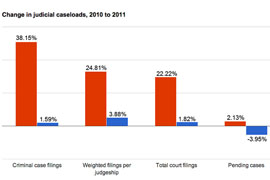Cronkite News has moved to a new home at cronkitenews.azpbs.org. Use this site to search archives from 2011 to May 2015. You can search the new site for current stories.
A year into emergency, Arizona federal courts still face ‘dire’ situation
WASHINGTON – Federal courts in Arizona are still in “dire circumstances” as an emergency declaration that was supposed to help judges keep pace with a crushing caseload is set to expire.
The judicial emergency declared last year in the wake of the shooting death of Chief Judge John Roll runs out Monday, but officials say the U.S. District Court for the state still faces many of the same challenges.
“The reason that existed last year still prevails this year,” Chief Judge Roslyn Silver said recently. “We are still in dire circumstances. We are under water.”
The judicial emergency more than doubled the time allowed for the government to bring a case to trial, giving the court some relief from a rising caseload and judicial vacancies in the district.
Through “lots of hard work” and the help of visiting judges, the district court has managed to stay within the original 70-day time frame for cases to come to trial under the Speedy Trial Act and has not had to invoke the 180-day limit allowed under the emergency.
But that balancing act could be thrown off, Silver said, without the extra help the court has been receiving.
“If we don’t have that, which is the fail-safe, then we’re in big trouble, because there’s just no way we could handle this caseload,” Silver said.
Arizona had the highest number of per-judge felony filings in the nation in fiscal 2011, at 554 criminal felony filings for each district court judge, according to the U.S. District Court Judicial Caseload Profile for Arizona. That load was fueled in part by the large number of immigration cases handled in the court, experts said.
The court also saw the total number of cases per judge grow by 22 percent in the fiscal year, from 793 to 969, the fourth-highest judicial caseload in the country, the report said.
It came as three of the 13 district judgeships allotted to the state were vacant. Two were empty last January when Roll was killed in the shooting spree at a Tucson supermarket that killed five others and wounded 13, including former Rep. Gabrielle Giffords.
The judicial emergency was declared by Silver after Roll’s death. It was extended last February to this March by the Judicial Council of the Ninth Circuit, in an effort to buy the district some breathing room.
President Barack Obama nominated two candidates in June to fill the vacancies, but only one, Judge Jennifer Guerin Zipps, has been appointed. The other nominee, attorney Rosemary Marquez, has been stalled in the Senate.
Brian Karth, the clerk for the district, said filling those vacancies is the minimum needed. He claimed that, according to judicial standards, the district’s caseload is high enough to warrant 10 additional judgeships.
In the meantime, the district has had to rely on visiting judges from other districts across the country, Karth said. One to two judges come each week to assist with court proceedings.
“We continue to struggle to keep within standards, and everybody’s basically forced to work harder and try to be resourceful in pulling together resources, sometimes from outside our district, to perform well,” Karth said.
“There’s certainly a wear and tear on anybody who has to sustain that sort of a pace for lengthy periods,” he said.
Walter Nash, a trial lawyer and partner with Nash & Kirchner in Tucson, said the “crushing” caseload in the district is having a serious impact on trials.
“It lessens the quality of justice for all parties involved,” Nash said.
Prosecutors have less time to prepare arguments, while victims’ cases aren’t resolved “as fast as they should be.” And judges could be rushed into a decision, meaning some guilty defendants may be acquitted, he said.
The need for new judges will be even greater when Speedy Trial Act provisions are reinstated next week after the emergency expires, Nash said.
“You get the best result … if everyone has time to handle a case properly,” Nash said.
Silver agreed that slow trials affect all sectors of the public and courts have an “obligation to ensure justice for all.” But with limited resources, space problems in courtrooms, large numbers of criminal cases and other concerns, trials could suffer, with civil trials in particular lagging behind or not getting the attention they deserve.
“So far we’re OK, but it will present a problem at some time,” Silver said. “We are required to act fairly in every criminal case, but there’s only so much we can do.”
The emergency cannot be renewed for six months after it expires. Silver said that if things don’t improve, officials will have to consider the possibility of renewing.
“There was a reason for it last year, and I expect there’ll be a reason for it this year,” she said.







